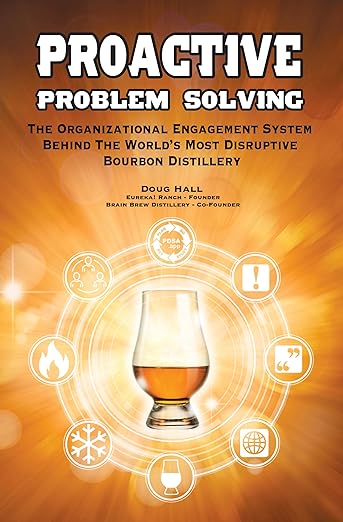In today’s fast-changing world, outdated systems and disengaged employees can drag a company down. Doug Hall, founder of Eureka Ranch and Brain Brew Distillery, has spent decades helping companies like Nike, Disney, and American Express implement structured problem-solving approaches. In his new book, Proactive Problem Solving, Hall offers practical strategies to reduce workplace inefficiencies and boost employee engagement. On the latest episode of Inside Automotive, Hall shares insights into how dealers can fix broken processes, foster innovation, and create a more engaged workforce.
Hall’s expertise in systems thinking traces back to his early career at Procter & Gamble, where he applied lessons from W. Edwards Deming to drive innovation. His core belief, inspired by Deming, is that:
- 94% of the problem is the system;
- 6% is the worker.”
According to Hall, today’s post-COVID workforce faces a significant engagement crisis, with many employees feeling checked out. His research discovered that the average manager spends three and a half hours per day dealing with employee mistakes or broken systems—nearly half the workday lost to inefficiencies.


Yet Hall’s book outlines a structured process for diagnosing systemic problems, motivating employees, and implementing low-risk solutions. He emphasizes the concept of “failing fast, failing cheap,” encouraging dealers to test small-scale improvements before making major changes. He also highlights the importance of psychological motivation in getting employees to participate in problem-solving, noting that once workers experience small wins, they are more likely to stay engaged and contribute to larger improvements.
Moreover, for dealers, Hall sees a unique advantage in embedding systems thinking from the start. At Brain Brew Distillery, he only hired employees who embraced structured problem-solving, avoiding the challenges of shifting an established culture. He contrasts this approach with larger organizations, where “firefighting” inefficient systems can consume leaders’ time, preventing them from focusing on growth.
Generational differences also play a role in engagement. Hall explains that younger employees, particularly Gen Z, need to understand why their work matters. He draws parallels to the military’s “Commander’s Intent” strategy, where leaders clearly outline the purpose behind tasks, making employees more likely to stay committed. He illustrates this with a case study from Kybeck, a cleaning equipment company that designed a no-touch bathroom cleaner, motivating workers by tying their efforts to improving sanitation and dignity for frontline workers.
Fear, Hall warns, is one of the biggest barriers to effective problem-solving. Employees often hesitate to take initiative due to fear of failure or concerns about job security. His book promotes an incremental approach, where small, low-risk experiments build confidence and lead to meaningful change. He shares the story of an employee at his distillery who resolved a major bottling line issue by running daily small-scale tests—an approach Hall likens to sports training, where incremental progress leads to game-time success.
Ultimately, Hall argues that organizations that prioritize systemic problem-solving create workplaces where employees feel valued, leaders can focus on strategic goals, and businesses achieve sustainable growth.


